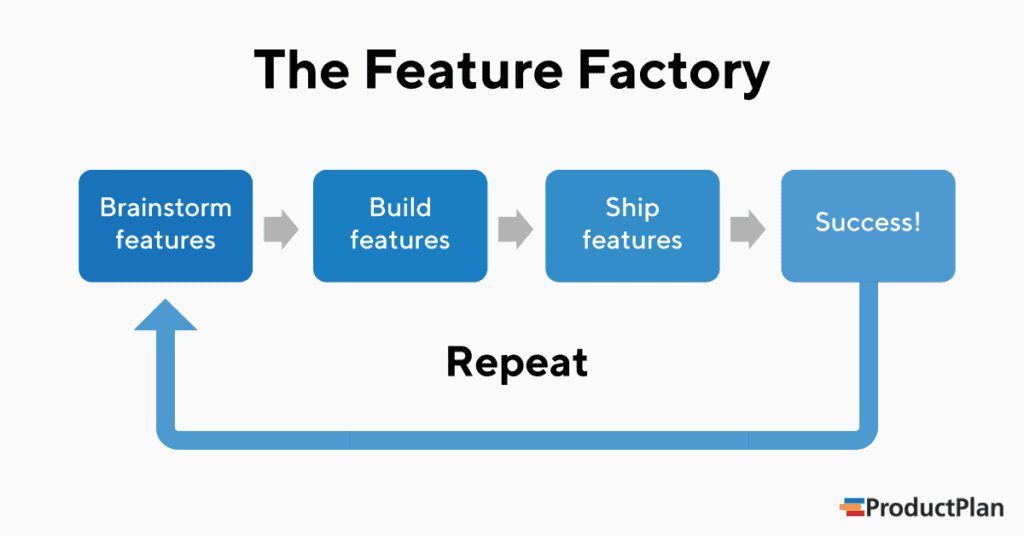What is a Feature Factory?
In product management lingo, feature factory is typically a derogatory term. It describes a business focused on building features rather than solving problems for customers. Here are a few characteristics of a feature factory:
- The product team measures its success by how much and often it ships.
- The company believes that adding a new feature always adds value to the product.
- The organization fails to test feature ideas before building them and fails to assess its success with users after the features ship.

What’s the Origin of the Term?
Product management expert John Cutler came up with the term feature factory. He saw some companies become more interested in completing story points than learning what types of functionality users actually wanted. It led Cutler to the factory metaphor. He viewed these organizations as factory workers assembling features without thinking about what they contributed to the product.
Cutler then published a popular feature-factory article in Hackernoon: 12 signs you’re working in a feature factory.
(Fun fact: John Cutler is a contributing author at ProductPlan.)
Hear John Cutler talk about this morning in the webinar, The Feature-Less Roadmap: Using Themes and North Stars to Ground Your Product Roadmap, below.
Why Do Companies Become Feature Factories?
No organization sets a goal to become a feature factory. It happens unintentionally, as the company becomes motivated by other priorities. Some common examples include:
- The leadership team wants to see more frequent product updates.
- The company culture celebrates completing projects, rather than measuring their impact with users.
- Sales put pressure on the product team to produce new features to help bring in leads and close more deals.
What Are the Dangers of Being a Feature Factory?
Falling into the feature-factory trap is dangerous for a business. The obvious problem is that some features won’t resonate with users, which means that wastes development’s time and budget. But there are other risks as well, less obvious, and more serious. For example:
- The company loses ground to competitors.
A business behaving like a feature factory spends time and resources cranking out features without first investigating whether or not those features will add value to the product.
At the same time, the company’s competitors could be researching to learn what problems the market needs solved and will pay for. Those competitors will gain credibility and market share while the feature factory is pushing out products the market might not care about.
- The product becomes bloated and difficult to use.
As a feature factory adds functionality to its product, without continuously testing and revising its UI and UX, chances are the product will become more complicated and challenging to use.
It’s because each new feature takes up real estate in the interface, making it harder to navigate and locate any feature the user wants to access.
- The company loses its strategic reason for being.
Products exist to solve problems, to improve people’s lives in some way. Those high-level goals should be captured on the product roadmap. A product without a strategic direction is probably doomed to fail—no matter how many features it contains.
It’s important to remember; features are simply a means to a strategic end: building products that solve problems for the market and add value to people’s lives. Building and releasing features is not an end in and of itself.
Related Terms: Feature-less roadmap / feature bloat / product strategy / customer empathy / prioritization
